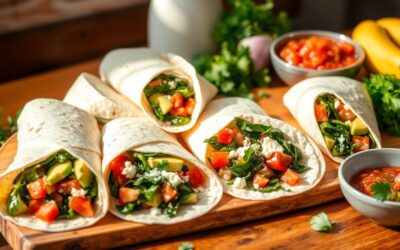Welcome to our guide on carrots and zucchini, two popular veggies. They add color and flavor to your meals and are good for your health. We’ll explore their nutritional values, cooking tips, and tasty recipes. This will help you add more of these healthy foods to your diet.
Whether you’re an experienced cook or just starting, learning about carrots and zucchini is key. It will make your cooking better and improve your health.
A vibrant composition of fresh carrots and zucchini arranged artistically on a rustic wooden table, showcasing their rich colors and textures, with soft natural light illuminating the scene, highlighting the curves of the zucchini and the leafy tops of the carrots.
Key Takeaways
- Carrots and zucchini are nutrient-rich, low-calorie vegetables.
- Both vegetables offer numerous health benefits and are easy to incorporate into meals.
- Cooking tips can enhance the flavor and retain the nutritional value of both vegetables.
- Creative recipes can make these staples exciting in your kitchen.
- Understanding growing conditions can help you cultivate your own carrots and zucchini.
Introduction to Carrots and Zucchini
Carrots and zucchini are well-loved veggies for their unique tastes and uses in cooking. Carrots stand out with their bright orange color. They’re full of beta-carotene, which is good for you. You can enjoy them raw, in salads, or roasted.
Zucchini, a summer squash, is known for its mild taste and flexibility. It’s great in many dishes, like stir-fries and casseroles. You can also use it raw in salads or as a low-carb noodle substitute.
Both carrots and zucchini add color and nutrition to our meals. They make any dish more vibrant and healthy.
| Vegetable | Color | Type | Culinary Uses |
|---|---|---|---|
| Carrots | Orange | Root | Salads, Snacks, Soups, Roasting |
| Zucchini | Green | Summer Squash | Stir-fries, Casseroles, Salads, Grilling |
Health Benefits of Carrots
Carrots are a nutritious veggie, packed with health benefits. They have a nutritional profile full of vitamins and minerals. This makes them a great addition to any meal. Their low calorie count and high nutrient levels are key to their health benefits.
Nutritional Profile of Carrots
Carrots are tasty and full of nutrients. They are rich in:
- Vitamin A
- Vitamin K1
- Potassium
- Fiber
This mix of nutrients boosts eye health, strengthens the immune system, and aids digestion. Knowing the nutritional profile of carrots shows their importance for health.
Antioxidant Properties of Carrots
Carrots are full of antioxidants, especially carotenoids. These compounds fight oxidative stress in the body. Studies suggest they may lower heart disease and cancer risks. This highlights the health benefits of carrots and why we should eat them more often.
| Nutrient | Amount per 100g | Health Benefit |
|---|---|---|
| Vitamin A | 1,058 mcg | Supports vision and immune function |
| Vitamin K1 | 13.2 mcg | Essential for blood clotting |
| Potassium | 320 mg | Helps regulate blood pressure |
| Fiber | 2.8 g | Promotes healthy digestion |
| Antioxidants | Varies | Reduces oxidative stress and inflammation |
Preparing and Cooking Carrots
Carrots are not only versatile but also packed with flavor. Knowing the different cooking methods can make them taste better and be more nutritious. Whether you like to steam, roast, or sauté, the right preparation makes them delicious.
Best Cooking Methods for Carrots
Several cooking methods can make carrots taste sweeter and better textured. Here are some effective techniques:
- Steaming: This method keeps nutrients and gives a tender, crisp bite.
- Roasting: Roasting brings out the caramelized flavors of carrots. A light drizzle of olive oil and your favorite spices can create a delightful side dish.
- Sautéing: Sautéing cooks carrots quickly, making them tender yet crisp. Pair with garlic or herbs for an aromatic twist.
Delicious Carrot Recipes
Explore a variety of carrot recipes that show off this versatile vegetable. Here are some tasty options to inspire your cooking adventures:
- Carrot Soup: A comforting blend of carrots, onions, and spices. Perfect for a chilly evening.
- Roasted Garlic Carrots: Toss carrots with garlic and herbs, then roast until golden brown for an irresistible side dish.
- Carrot Cake: Indulge in a moist cake featuring grated carrots, nuts, and a creamy frosting. This dessert highlights the sweetness of carrots.
Whether you choose to steam, roast, or sauté, these recipes show the diversity of carrot dishes. Trying different cooking techniques can lead to delightful discoveries in your kitchen.
Understanding Zucchini
Zucchini is a special vegetable known for its unique traits. It’s low in calories and high in water, making it different from other squashes. Its tender texture and mild taste make it great for many dishes.
Zucchini is loved for its versatility in both sweet and savory dishes. It can be used in stir-fries, salads, and even baked goods like bread and muffins. This makes it a go-to ingredient for healthy meals.
Zucchini is also packed with vitamins and minerals, offering great health benefits. Adding it to your meals can please your taste buds and support a balanced diet.
| Vegetable Characteristic | Zucchini | Other Similar Squashes |
|---|---|---|
| Calories (per 100g) | 17 | Varies (20-40) |
| Water Content | Approximately 95% | 85-90% |
| Texture | Tender and crisp | Varies (often firmer) |
| Common Culinary Uses | Salads, stir-fries, baked goods | Soups, casseroles, roasting |
Adding zucchini to your diet promotes healthy eating and lets you get creative in the kitchen. Its unique qualities and uses can make simple meals into special occasions.
Health Benefits of Zucchini
Zucchini is a top pick for those watching their calories. It has fewer than 20 calories per cup. This makes it a great choice for many dishes without losing flavor or health perks.
Low-Calorie Vegetable Option
Zucchini is perfect for diets that watch calories. It adds volume to meals without many calories. Its soft texture and mild taste make it easy to use in salads, stir-fries, and baked goods.
Rich in Nutrients
Zucchini is packed with nutrients. It’s full of vitamins in zucchini, like vitamin C, which boosts the immune system. It also has potassium and magnesium for heart health and body functions. Eating zucchini often can help keep you hydrated and healthy.
Preparing and Cooking Zucchini
Cooking zucchini opens up a world of flavors and textures. This versatile veggie works well in many ways. From grilling to baking, or even making noodles, the right method makes your dishes better and keeps them healthy.
Ways to Cook Zucchini
Getting zucchini ready is crucial. Here are some top ways to cook it:
- Grilling: Sliced zucchinis get sweeter and smokier, perfect for summer.
- Baking: Roasted zucchini is crispy on the outside, great in many meals.
- Spiralizing: Zucchini noodles are a tasty, low-carb option for pasta lovers.
Creative Zucchini Recipes
Adding zucchini to your meals can be both fun and healthy. Here are some creative ideas:
- Zucchini Fritters: These crispy, flavorful bites are perfect as appetizers or sides.
- Stuffed Zucchini Boats: Fill zucchinis with savory mixtures for a satisfying main dish.
- Zucchini Bread: Moist and sweet, zucchini bread is great for breakfast or a snack.
A vibrant kitchen scene featuring fresh zucchini on a wooden cutting board, a chef’s knife poised next to it, a skillet heating on the stove with olive oil shimmering, herbs and spices in jars in the background, natural light streaming through a window, creating an inviting atmosphere for cooking.
Complementary Vegetables: Brussels Sprouts, Red Onions, Cauliflower
Exploring vegetables can show us how different ones can make each other better. Brussels sprouts, red onions, and cauliflower are great with carrots and zucchini.
Brussels sprouts are full of fiber and vitamins. They’re small but mighty, adding texture and health benefits to dishes. Roasting or sautéing them with carrots makes for a tasty mix.
Red onions add a sweet and savory flavor. They’re also full of antioxidants, boosting the health of your meals. Adding them to zucchini can turn a simple salad into something amazing.
Cauliflower is loved for being a low-carb option in many recipes. It can replace grains and is used in everything from rice to pizza crust. Mixing cauliflower with Brussels sprouts and carrots makes for a colorful, healthy dish.
Combining Brussels sprouts, red onions, and cauliflower with carrots and zucchini makes meals look and taste better. It also encourages us to get creative in the kitchen.
| Vegetable | Key Nutritional Benefits | Best Pairings |
|---|---|---|
| Brussels Sprouts | High in fiber, vitamins K and C | Carrots, red onions |
| Red Onions | Rich in antioxidants, vitamins C and B6 | Zucchini, cauliflower |
| Cauliflower | Low in carbs, high in vitamins C and K | Brussels sprouts, carrots |
Adding these complementary vegetables to meals makes them healthier and more enjoyable. A little variety can make a big difference in the kitchen.
The Vegetables – Carrots, Zucchini, Brussels Sprouts, Red Onions, Cauliflower
Learning about the health benefits of different vegetables can make any meal better. This guide focuses on five key vegetables: carrots, zucchini, Brussels sprouts, red onions, and cauliflower.
Carrots are crunchy and sweet, great for snacks and salads. They’re full of beta-carotene, fiber, and vitamins, boosting your health. On the other hand, zucchini is low in calories but packed with nutrients, helping with weight control.
Brussels sprouts are tiny cabbages with lots of vitamins C and K, offering strong antioxidants. They add an earthy flavor to dishes, making meals better. Red onions have a sharp taste and are good for fighting inflammation and have antioxidants. Cauliflower is creamy and has a unique taste, often used as a substitute in recipes like rice and pizza crusts.
Mixing these vegetables in your cooking opens up a world of flavors. Try carrots and zucchini in a stir-fry or add Brussels sprouts and red onions to a salad. Roasted cauliflower goes well with many dishes. Each vegetable not only makes food taste better but also adds important nutrients for a healthy diet.
Adding carrots, zucchini, Brussels sprouts, red onions, and cauliflower to your meals makes eating more flavorful and healthy. Try these options to enjoy a wide range of tastes and health benefits!
Gardening Tips for Growing Carrots and Zucchini
If you love gardening, growing carrots and zucchini can be rewarding. These veggies need the right conditions to grow well. Good soil, enough sunlight, and pest control are key.
Soil and Sunlight Requirements
Carrots and zucchini need the right soil and sunlight.
- Soil Type: Carrots do best in sandy loam. Zucchini likes loamy soil with lots of organic matter.
- pH Level: Both veggies grow well in slightly acidic to neutral soil. Aim for a pH of 6.0 to 7.0.
- Sunlight: They need lots of sunlight. Make sure they get at least 6 to 8 hours a day.
Common Pests and How to Manage Them
Pests can be a big problem for gardeners. Knowing how to deal with them can protect your crops.
- Aphids: These tiny pests harm plants by sucking sap. Use insecticidal soap or a strong water spray to keep them away.
- Carrot Flies: They lay eggs near carrots. Cover your crops with floating row covers to stop them.
- Squash Bugs: These bugs can hurt zucchini plants. Try hand-picking or using traps to control them.
By following these tips, you can enjoy growing carrots and zucchini. You’ll get a great harvest.
A vibrant garden scene showcasing healthy rows of orange carrots and green zucchini plants, with rich soil, lush green leaves, and sunlight filtering through the foliage, surrounded by garden tools like a watering can and trowel.
Storage Tips for Fresh Produce
Keeping your fresh produce, like carrots and zucchini, in top shape is key. Using the right storage tips helps them stay fresh and full of nutrients. This way, they can last longer and stay crunchy.
Carrots should be stored in the fridge. Keep them unwashed in a bag or container to keep moisture in. This way, they can stay fresh for up to three weeks. Zucchini also does well in the fridge. Putting it in a produce bag helps it stay fresh for about a week.
| Vegetable | Storage Method | Optimal Temperature | Shelf Life |
|---|---|---|---|
| Carrots | Store in a plastic bag, unwashed in the fridge | 32-40°F | Up to 3 weeks |
| Zucchini | Keep in a produce bag in the fridge | 32-40°F | About 1 week |
By following these storage tips, your produce will stay fresh and tasty. This helps cut down on waste and makes meal prep easier.
Seasonal Availability of Carrots and Zucchini
Knowing when carrots and zucchini are in season can make your meals better. These veggies taste best when picked at the right time. Freshness is key to their great taste and quality.
Carrots grow well in cooler weather. They’re ready from early spring to late fall. This means they’re available from March to June and again from September to November. The cooler months make them sweeter, adding crunch to salads and roasts.
Zucchini loves warmer weather and is at its best in summer. It’s prime from June to August, offering a lot for various dishes. Buying zucchini in these months ensures you get the best flavor and quality.
| Vegetable | Peak Season | Flavor Profile | Uses |
|---|---|---|---|
| Carrots | March – June, September – November | Sweet, earthy | Salads, soups, roasting |
| Zucchini | June – August | Mild, versatile | Stir-fries, grilling, baking |
If you garden, planting carrots and zucchini at the right time is crucial. It leads to a bountiful harvest. This way, you can enjoy these healthy veggies at their best.
Conclusion
Exploring carrots and zucchini shows us how great they are for our health. Each one has many benefits, making them key to a healthy diet. Carrots add a crunchy texture, while zucchini is super versatile.
This guide invites you to try new recipes with these veggies. You can steam them simply or get creative. Even growing your own can be fun, giving you fresh food and joy in cooking.
By adding these veggies to your meals, you can make them healthier and more enjoyable. Dive into the world of carrots, zucchini, and more. Enjoy making delicious, vibrant dishes!
FAQ
What are the health benefits of carrots?
Carrots are packed with vitamins A, fiber, and antioxidants. These support eye health, boost immunity, and aid digestion. They’re also low in calories, making them a healthy diet addition.
How can I incorporate zucchini into my meals?
Zucchini is versatile and can be grilled, sautéed, baked, or spiralized. Add it to salads, stir-fries, or baked goods like zucchini bread. It’s a nutritious, low-calorie option for many dishes.
What are some creative recipes for carrots?
Try carrot soup, roasted garlic carrots, or carrot cake. These recipes showcase carrots’ natural sweetness and offer a wealth of nutrients.
How should I store fresh carrots and zucchini?
Store carrots and zucchini in the fridge to keep them fresh. Place them in a produce drawer at 32°F. Wrapping them in a paper towel helps absorb moisture for longer storage.
When is the best season to buy carrots and zucchini?
Carrots are best in spring and fall, while zucchini peaks in summer. Buying them in season ensures freshness and flavor.
Are there any gardening tips for growing carrots and zucchini?
For successful growth, carrots and zucchini need well-drained soil and sunlight. Watch out for pests like aphids and squash bugs. Use organic methods to protect your crops.
What are complementary vegetables to pair with carrots and zucchini?
Brussels sprouts, red onions, and cauliflower pair well with carrots and zucchini. They add flavor, texture, and nutrients to dishes.
How can I prepare carrots to retain their nutrients?
Steaming, roasting, or sautéing carrots is best. These methods preserve nutrients while bringing out their sweetness and flavor.








